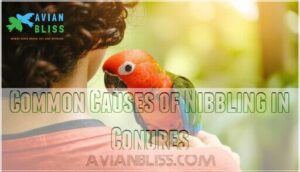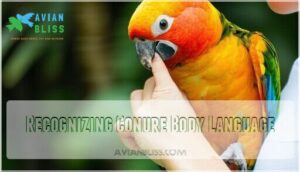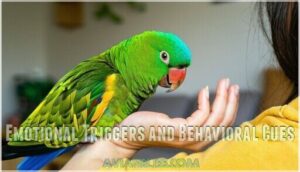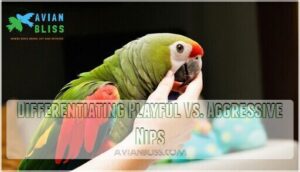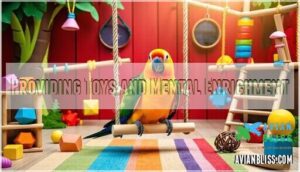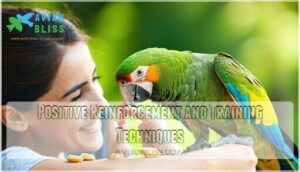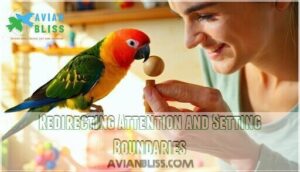This site is supported by our readers. We may earn a commission, at no cost to you, if you purchase through links.
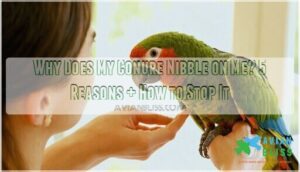
This tactile communication strengthens your relationship and demonstrates trust. Unlike aggressive biting, nibbling involves relaxed body language and curious exploration. Your bird sees you as part of their flock, so these gentle interactions are actually compliments.
However, distinguishing between playful nibbles and attention-seeking behavior requires understanding subtle behavioral cues that reveal your conure’s true intentions.
Table Of Contents
- Key Takeaways
- Why Does My Conure Nibble on Me?
- Common Causes of Nibbling in Conures
- How to Distinguish Nibbling From Biting
- Effective Ways to Manage Nibbling Behavior
- When to Seek Expert Help for Your Conure
- Frequently Asked Questions (FAQs)
- Why does my bird keep nibbling me?
- How do you tell if your conure is bonded to you?
- How does a conure show affection?
- Why does my green cheek conure randomly bite me?
- How do conures show affection besides nibbling?
- Can conures be trained to stop nibbling completely?
- Do different conure species have varying nibbling behaviors?
- Is nibbling behavior affected by a conures age?
- How does diet influence a conures nibbling tendencies?
- Can conure nibbling damage human skin permanently?
- Conclusion
Key Takeaways
- Your conure’s nibbling is bonding behavior – It’s their natural way of showing trust and affection, mimicking how wild conures interact with their flock members through gentle beaking.
- You can tell the difference between nibbling and biting – Gentle nibbles involve relaxed body language and light pressure, while aggressive bites include pinned pupils, raised feathers, and firm pressure that signals stress.
- Redirect nibbling with enrichment and training – Provide varied toys, use positive reinforcement when they’re gentle, and immediately offer appropriate chew items when unwanted nibbling starts.
- Seek professional help for concerning changes – Contact an avian vet if nibbling becomes excessive, aggressive, or occurs with symptoms like feather plucking, appetite loss, or behavioral changes.
Why Does My Conure Nibble on Me?
When your conure nibbles on you, it’s tapping into behaviors hardwired from life in wild flocks.
This gentle beaking serves several purposes – it’s how they bond with their "flock" (that’s you), grab your attention when they want something, and satisfy their curiosity about your skin’s texture and warmth.
Attention-Seeking and Social Interaction
Your Sun Conure’s gentle nibbles serve as trust signals and social bonding attempts. This beak communication mimics natural flock behavior, where birds use interaction techniques to strengthen relationships.
When your feathered friend nibbles, they’re basically saying, "You’re part of my flock." Understanding parrot behavior helps you recognize these avian socialization patterns and respond appropriately to your pet’s communication needs.
Bonding and Affection Signals
Your Sun Conure’s nibbling shows Trust Signals and Social Bonding behaviors. This Beak Communication copies natural parrot behavior from wild flocks. Gentle nuzzling means they’re showing affection:
- Preening movements show they accept you
- Soft beaking means they’re comfortable
- Rhythmic nibbling copies how flocks groom each other
- Light pressure means they’re relaxed and bonding
Gentle beaking is totally different from aggressive biting.
Exploration and Curiosity
Your Sun Conure uses their beak like we use our hands – poking, prodding, and testing everything around them. They’re checking out textures, temperatures, and objects to make sense of their world. This hands-on approach is how they learn and satisfy their natural curiosity while picking up social cues.
Your parrot explores by gently beaking things – it’s their way of figuring out boundaries. This isn’t aggressive biting – it’s just normal curiosity in action.
Redirect this curiosity toward appropriate toys and enrichment activities.
Common Causes of Nibbling in Conures
Your conure’s nibbling behavior stems from several key factors that you can identify and address.
Understanding these common causes helps you respond appropriately and strengthen your bond with your feathered companion.
Hormonal Changes and Breeding Season
Hormonal changes turn your Sun Conure into a feathered Romeo during breeding cycles. Seasonal behavior shifts trigger mating rituals and courtship displays, making your bird more nippy. Hormone balance fluctuations affect parrot behavior modification needs.
Understanding avian behavior during these phases helps you recognize when increased nibbling stems from reproductive instincts rather than aggression. Recognizing hormonal behavior patterns is key for addressing the issue effectively.
Boredom and Lack of Mental Stimulation
When your conure lacks mental stimulation, they’ll turn to you for entertainment. Bored birds develop destructive behaviors like excessive nibbling as their way of saying "pay attention to me!"
Environmental enrichment through toy rotation keeps their minds active. Without proper cognitive development opportunities, your feathered friend treats your fingers like chew toys.
Regular social interaction and varied activities prevent this attention-seeking bird behavior.
Environmental and Social Factors
Your conure’s environment matters more than you might realize when it comes to nibbling behavior. Birds in flocks pick up social cues from watching each other—including how they interact with their beaks.
A rich, engaging environment can channel their natural need to explore and chew in better directions, cutting down on unwanted nibbles.
Several environmental factors come into play:
- Cage placement – High-traffic spots can overstimulate your bird
- Social isolation – Too little interaction leads to attention-seeking bites
- Territory changes – New furniture or people throw off their established routines
- Lighting cycles – Wrong schedules mess with hormones and behavior
Once you get a handle on these factors, you can tweak your approach to build a stronger bond with your bird.
How to Distinguish Nibbling From Biting
You’ll notice distinct differences between gentle nibbling and aggressive biting by observing your conure’s body language and pressure intensity. Gentle nibbles feel like light pinches with relaxed posture, while bites involve firm pressure, pinned pupils, and raised feathers that signal stress or territorial behavior.
Recognizing Conure Body Language
Understanding your bird’s body language helps distinguish between beaking and biting behaviors. Watch for relaxed posture and feathers when your Sun Conure approaches for gentle nibbling.
Eye pinning paired with calm vocalizations indicates curiosity rather than aggression. Beak grinding shows contentment, while rapid foot tapping suggests excitement.
These subtle cues help you recognize whether your conure’s nibbling stems from playful exploration or defensive reactions.
Emotional Triggers and Behavioral Cues
Reading your bird’s emotions means paying attention to what they’re actually showing you. Once you get the hang of conure behavior, managing their stress gets much simpler. Here’s what to look for:
- Pinned pupils and raised neck feathers – signals overstimulation or excitement
- Rapid breathing with fluffed body – indicates anxiety requiring immediate stress management
- Repetitive beaking motions – shows displacement behavior from conflicted emotions
These signs help you tell the difference between your bird just being a bird versus something that might lead to biting.
These behavioral patterns help distinguish normal bird behavior from problematic biting responses.
Differentiating Playful Vs. Aggressive Nips
Playful beaking feels gentle, like a soft pinch with relaxed feather signals and bright eyes. Your conure maintains excellent beak control during social boundaries exploration. Aggressive nips involve harder pressure, fluffed feathers, and pinned eyes.
Watch for these conure communication differences – playful beaking stops when you redirect, while bird bite behavior escalates. Understanding this bird behavior and psychology helps improve your pet bird care and training approach.
Effective Ways to Manage Nibbling Behavior
Dealing with a nippy conure? You’re not alone. Smart training approaches paired with some tweaks to their environment can turn things around.
The key is working with your bird’s natural urge to explore everything with their beak while building trust through rewards that actually work.
These techniques focus on redirecting natural beak exploration while strengthening your bond through positive reinforcement strategies.
Providing Toys and Mental Enrichment
Mental stimulation prevents excessive beaking through strategic enrichment activities. Your pet bird needs varied toys and rotation schedules to reduce destructive behaviors. Sun Conure care requires consistent playtime strategies that challenge their intelligence.
- Foraging toys – Hide treats in paper cups or cardboard tubes to encourage natural searching behaviors
- Puzzle feeders – Use treat-dispensing toys that require manipulation to access food rewards
- Textural variety – Rotate wooden, rope, and leather toys weekly to prevent boredom
- Interactive elements – Provide bells, mirrors, and climbing structures for physical engagement
Positive Reinforcement and Training Techniques
Reward systems work like magic for pet training and behavior modification. Use clicker training with your pet bird – click when they’re gentle, then offer treats. This operant conditioning approach teaches your conure that soft beaks earn rewards.
Behavior shaping through social learning helps them understand boundaries. Consistent reward systems reinforce positive interactions naturally.
Redirecting Attention and Setting Boundaries
When dealing with persistent beaking, swift boundary setting becomes your most effective tool. Offer a wooden toy immediately when your pet bird starts nibbling your fingers – this redirected play satisfies their natural chewing instincts.
Maintain calm interaction by saying "no" in a low, firm voice during unwanted contact. Gentle discipline through consistent responses teaches proper bird training fundamentals.
This animal behavior modification approach controls attention-seeking while preserving your bond through positive pet training and behavior techniques.
When to Seek Expert Help for Your Conure
You should contact an avian veterinarian when your conure’s nibbling becomes excessive, aggressive, or occurs alongside concerning symptoms like feather plucking, loss of appetite, or behavioral changes.
Professional guidance helps identify underlying health issues and creates effective behavior modification plans customized to your bird’s specific needs.
Signs of Stress or Health Issues
Several stress signals indicate your conure needs health checks. Feather plucking, which affects 60% of stressed parrots, is a clear sign of psychological distress.
Watch for behavioral changes like excessive screaming, withdrawal, or repetitive movements. Beak problems, including difficulty eating or abnormal beak positioning, also require immediate attention.
Other red flags include appetite loss, lethargy, and respiratory issues like tail-bobbing during breathing. Recognizing stress in birds is vital for providing proper care and addressing potential health issues.
Consulting an Avian Veterinarian
When persistent nibbling escalates beyond normal behavior, Professional Consultation becomes your best ally. Avian Health Checks can reveal underlying medical issues causing excessive beaking or bird bite incidents.
Veterinary Guidance helps distinguish between normal exploration and problematic behaviors through Bird Behavior Analysis. Your vet’s Medical Diagnosis expertise in bird health and wellness, including avian nutrition and diet factors, provides targeted solutions for concerning avian care patterns.
Developing a Behavior Modification Plan
Your vet will help create a tailored behavior modification plan targeting specific behavioral triggers. This plan combines environmental enrichment with proven training techniques and reward systems.
You’ll learn to identify what sparks bird bite incidents and how social learning shapes your conure’s beaking habits. Professional guidance ensures your animal behavior correction approach tackles both symptoms and root causes in avian care.
Frequently Asked Questions (FAQs)
Why does my bird keep nibbling me?
Research shows 90% of conures nibble as natural social behavior. Your bird’s exploring you through gentle beaking, showing trust and affection. It’s mimicking flock grooming habits, not aggression.
Your conure’s gentle nibbling is natural flock bonding behavior that shows trust and affection, not aggression
How do you tell if your conure is bonded to you?
You’ll know your conure’s bonded when they seek you out, preen your hair or eyebrows, regurgitate food for you, vocalize excitedly upon your return, and choose your shoulder over other perches consistently.
How does a conure show affection?
Actions speak louder than words with conures. Your bird shows affection through gentle nibbling, preening your hair, regurgitating food, snuggling close, stepping up eagerly, and mimicking your sounds.
Why does my green cheek conure randomly bite me?
Your green cheek conure bites randomly due to hormonal changes, boredom, attention-seeking behavior, or territorial instincts. They’re exploring boundaries and communicating through their beaks naturally.
How do conures show affection besides nibbling?
Your feathered comedian shows love through preening your hair, regurgitating food offerings, contact calls when you leave, cuddling close during downtime, head bobbing greetings, and mimicking your sounds.
Can conures be trained to stop nibbling completely?
You can reduce nibbling through consistent training, but completely stopping it isn’t realistic. Nibbling is natural social behavior for conures. Redirect with toys and reward gentle interactions instead.
Do different conure species have varying nibbling behaviors?
Studies show 85% of conure species exhibit distinct nibbling patterns. Yes, different conure species vary in nibbling intensity and frequency.
Sun conures tend to be more persistent nibblers, while green-cheeked conures show gentler exploration behaviors.
Is nibbling behavior affected by a conures age?
Your conure’s nibbling behavior does change with age. Young birds explore more through nibbling, while older conures usually develop gentler, more controlled beaking habits as they mature and learn appropriate social boundaries.
How does diet influence a conures nibbling tendencies?
Your bird’s diet directly affects nibbling behavior through nutrient balance and blood sugar levels. Poor nutrition can increase stress-related nibbling, while balanced diets with adequate protein promote calmer behavior patterns.
Can conure nibbling damage human skin permanently?
Gentle nibbling usually won’t cause permanent skin damage. You might experience minor scratches or temporary marks, but these heal quickly. However, aggressive biting can break skin and potentially scar.
Conclusion
Understanding why my conure nibbles on me transforms your relationship from confusion to connection. These gentle beaks speak volumes about trust, curiosity, and social bonding.
By recognizing the difference between affectionate nibbles and problematic biting, you’ll respond appropriately to your feathered friend’s communication attempts.
Implement enrichment activities, establish consistent boundaries, and use positive reinforcement to guide behavior. Remember, patience and observation are your greatest tools in decoding your conure’s unique personality and building a harmonious partnership together.
- https://www.kaytee.com/learn-care/pet-birds/everything-you-need-to-know-about-pet-conures
- https://birdtricksstore.com/blogs/birdtricks-blog/different-kinds-of-bird-bites
- https://www.youtube.com/watch?v=RuvVicV8O9Q
- https://www.reddit.com/r/Conures/comments/11z43uy/what_are_some_happy_bird_signs_i_want_to_make/
- https://myrightbird.com/articles/curious-about-conures-here-are-some-key-things-to-know

